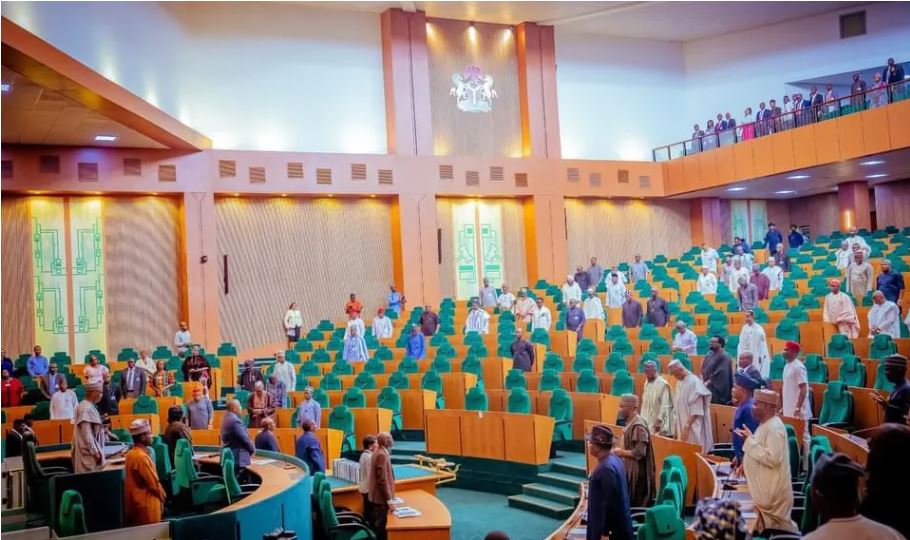Contents
Accelerated passage of “smuggled” National Anthem Bill, exemption of military from tolling,
Last week in the Green Chamber was heading towards what could have been described as a quiet week. The notice paper for the week was filled with the usual motions and bills. Everything changed on Thursday when the National Anthem bill was “smuggled” into Thursday’s OrderPaper in the middle of plenary.
The House of Representatives passed the bill seeking to revert to the old National Anthem. The manner with which the bill was introduced and the speed with which it was passed jarred the whole country.
PREMIUM TIMES reported in detail the steps that led to the passage of the bill by the House and the attempts by opposition lawmakers to stop it.
Expectedly, its passage has dominated public discourse, with many questioning the need to revert to the 1960-1978 anthem.
The nation is polarised along the lines of those in support of the old anthem and those in favour of the status quo. However, one sentiment appears very loud—how would this affect the prices of goods in the market?
Perhaps if the lawmakers had held a public hearing on the bill, Nigerians would have gotten the opportunity to ask this question and many more.
Instead, the lawmakers ambushed Nigerians with the legislation. As things stand, the opposition to the bill is growing on a daily basis.
Honouring the military at tollgates, seaports and others
On Wednesday, the lawmakers called on the federal government to exempt the men of the Armed Forces of Nigeria from paying tolls at airports, seaports, train stations and motor parks.
The resolution was in reaction to a recent decision of the Federal Executive Council (FEC) to abolish all exceptions for tolls at the Airports.
FEC’s resolution stated that everyone, including the president, must pay a toll at the gate of the airports.
However, the lawmakers, following a motion moved by Abdulsamad Dasuki (APC, Sokoto), resolved that the military should be excluded from those who are to pay tolls at airports and also extended it to the seaports and others.
This move by the lawmakers may defeat the essence of the FEC resolution on tolling because most VIPs in Nigeria are driven by security personnel.
President, governors, ministers, ranking lawmakers and others often have military personnel in their vehicles, therefore, this exemption could be extended to the VIPs and retain the revenue leakages the government seeks to prevent.
Nigerian elites are notorious for seeking undue privileges. Despite the insufficient number of police citizens, many of them have a high number of police officers attached to them. Similarly, they use sirens even when there is no emergency, and they seldom respect traffic lights.
This resolution by the lawmakers may end up benefiting VIPs more than ordinary Nigerians.
Intervention to stop the illegal shutdown of Banex Plaza
Two weeks ago, the Nigerian Army brazenly shut down a popular commercial hub in Abuja, named Banex Plaza, after some of its men were involved in a spat with shop owners.
The army illegally shut down the plaza under the guise of investigating the incident.
READ ALSO: End the illegal closure of Banex Plaza, Abuja, By Femi Falana
The House on Thursday, during plenary, urged the federal government to open the market and end the illegal shutdown by the military.
This call by the lawmakers followed a motion moved by Whingan Olusesan (APC, Lagos).
While resolutions of the House do not carry the force of law, however, this would be another litmus test for resolutions and legislative pronouncements.
Sending all security resolutions to the NSA
For years, presenting and passing security-related motions have become a daily affair, but compliance has been almost non-existent.
Last week, the House resolved to take a different path. It resolved to henceforth send all security-related motions to the Office of the National Security Adviser for implementation.
The Minority Leader of the House, Kingsley Chinda, moved the motion and was unanimously approved by the House.
No doubt, this move by the lawmakers may help to ensure proper coordination because, in the past, resolutions were sent to different outfits for implementation.
Under this new system, the NSA, Nuhu Ribadu, is in the position to integrate resolutions of the House into the security plans of the executive in line with Section 4(3) of the National Security Agencies Act.
One of the functions of the NSA includes “Correlating and evaluating intelligence reports relating to national security and providing the appropriate dissemination of such intelligence within Government using existing facilities as the President may direct.”
The $100 million malaria intervention loan revelation
Nigeria is currently in a fix over utilising a $100 million malaria intervention loan from the Islamic Development Bank due to procurement fraud.
The Minister of Health and Social Welfare, Ali Pate, appeared before a House Committee on Committee on HIV/AIDS, Tuberculosis and Malaria to provide answers on the status of the loan.
However, one major thing was obvious during the hearing— the committee chairman and members still have a lot to learn about the parliamentary process and procedures.
The Committee, chaired by Amobi Ogah, had a session that could best be described as “chaotic”. The chairman, a first-timer, completely lost control of the proceedings while members were throwing around “point of order” without making reference to any specific order. The lack of decorum by the members of the committee was an “eye sore.”
At a point, the members of the committee insisted on putting staff of the United Nations Office for Project Services (UNOPS) on oath. But Mr Pate, who has worked in international circles, refused, stating that the lawmakers cannot. This issue generated long debate until one of the lawmakers searched the web to ascertain the claim made by the minister.



















































